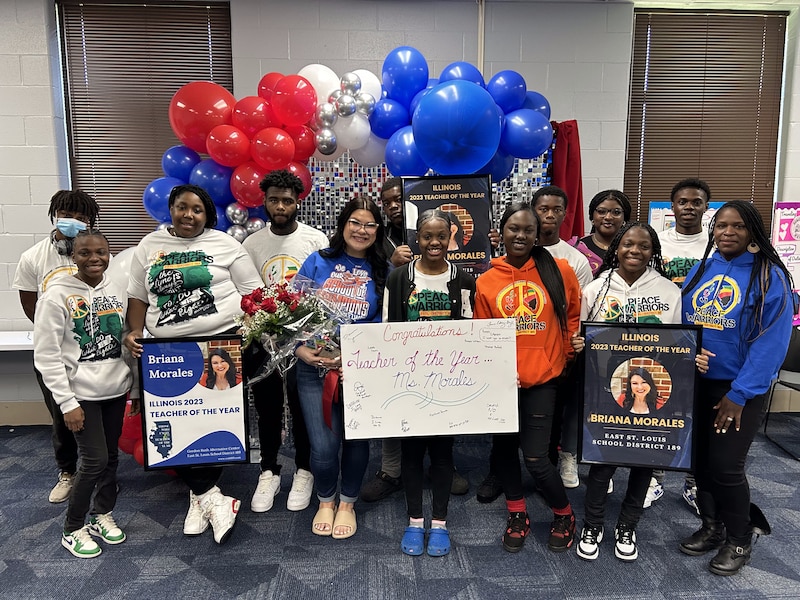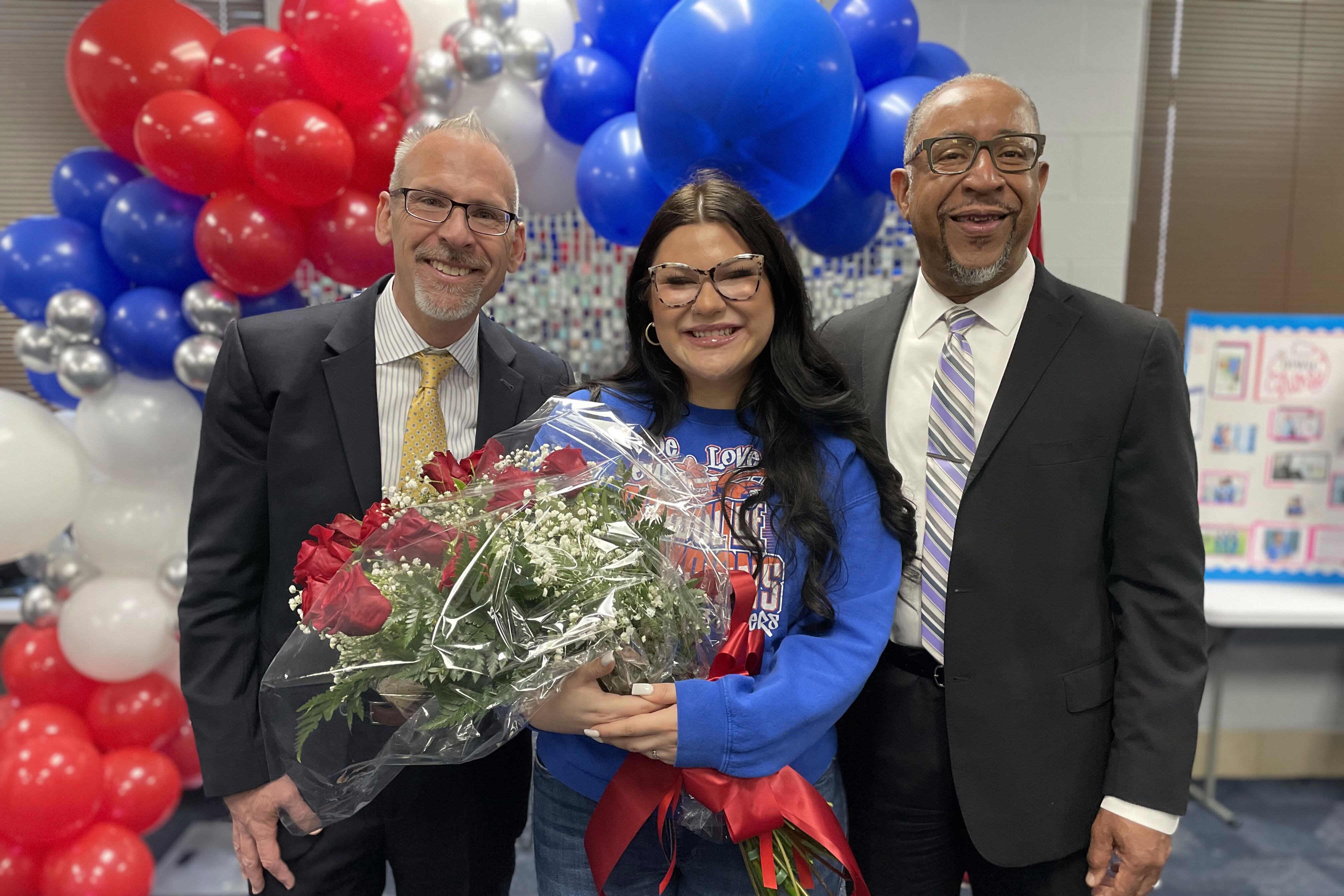East St. Louis teacher Briana Morales and a group of her students at Gordon Bush Alternative Center had just started their regular morning task of making school announcements when their routine was interrupted.
State Superintendent Tony Sanders and Bush principal Darnell Spencer had stopped by with some unexpected news: Morales had been named Illinois Teacher of the Year.
Morales, who has been in the classroom only six years, teaches English at Bush, an alternative school that serves a majority of Black students from low-income families. She was recognized for using writing and poetry to help her students process poverty, personal loss, and violence.
The first thought that came to her mind after she learned of the award on April 17 was “You really, really outdid yourself with this one!” – a phrase she often says to her students.
With state funding that she will receive from winning the award, Morales will take a year off, starting in July, to work with other teachers across the state, mentor early-career teachers, and represent Illinois in the National Teacher of the Year program.
Chalkbeat Chicago spoke with Morales to talk about her time as a teacher so far.
This interview has been lightly edited for clarity and length.

Why did you want to become a teacher?
I became a teacher because I had a phenomenal middle school English teacher. In seventh grade, I was struggling with complex life changes at home and I experienced a lot of trauma as a child. My teacher at the time tried to equip me with the skills to battle everything that I was going through. She taught me how to write poetry as a way to cope. I wrote my first poetry book in her class and I never stopped writing. It was powerful to have an adult to see me for what I was going through and not just as some random kid in their classroom.
You’ve spent the majority of your career teaching at an alternative school. Why?
I think alternative education is representative of the underdog in all of us. They are the kids that you’re rooting for to turn the tide and be who they want to be with the right resources. These are kids who may have unmet needs and lagging skills, but one caring adult can break the chains for so many children. We have a moral responsibility to ensure that every child has access to equitable experiences that allow them to be their authentic selves, especially in alternative education.
Writing and poetry were a way for you to process trauma in your life as a student. How have you used those experiences to work with your students today?
I was named an early career educator of color by the National Council for Teacher of English in 2021. Along with working with a cohort of educators across the country, I was able to work on a two-year research project with our students where we focused on writing poetry. Some of the lessons that we used in class were asking students to write about group up in East St. Louis because while every kid in that community may have overlapping experiences, their lived experiences are vastly different. In order to dismantle single stories and provide counter narrative for marginalized communities, poetry allows students to decide for themselves “What am I seeing and What do I make of it?”
What’s something happening in the community that affects what goes on inside your classroom?
Gun violence. I have lost a lot of students to gun violence. We are fortunate to have a wraparound wellness center in East St. Louis that has a 24-hour on-site trauma response team for some of the adverse experiences that my students might be dealing with. However, when we think about the toll that adverse childhood experiences have not just on a student, but also their family, the community, and then the educators that serve them. Not only am I trying to support a young person through navigating what it looks like to lose a sibling or classmate, I’m trying to figure out what that looks like for me. Having to console students, take them to funerals, helping families fundraise for a headstone and other things have greatly impacted my career.
Throughout Illinois, communities are being hit hard by gun violence. It’s often difficult for teachers to talk about it with their students. How do you start a conversation with students about gun violence?
I’m Mexican, something that is important to me and sharing with my students is the belief that there is more time than there is life. We may live a different life on the other side, and the only way that we can do that is if someone keeps our memory alive. I’m big on talking about memories and the legacies that people leave behind every year. I allow my students to share memories of loved ones, think of activities to do to honor that person, and brainstorm organizations that we want to donate to in that person’s spirit, so that we can carry their life on.
As a teacher, you prioritize your students’ mental health. What else can districts or the state do to support teachers and students?
We need to honor the fact that mental health needs to be addressed by a professional who is not a teacher. There need to be changes to legislation and policy to ensure that all students have access to mental health professionals in their school building on a daily basis, at the level that they need. There need to be resources available for school districts to create partnerships with community organizations that may not be able to afford a mental health professional in schools to meet with students and their families.
What’s the best advice you’ve received in your career, and how have you put it into practice?
“Find your marigold.” Educators use the term “marigold” to think about the people you gravitate towards, get advice from, and sustain you in the work that could be a colleague or a friend. It’s really important for newer educators to find people to support you and remind you of your why. You need people to guide you through difficult times, because as high as the mountains are sometimes in education, the valleys are also very low.
Samantha Smylie is the state education reporter for Chalkbeat Chicago, covering school districts across the state, legislation, special education, and the state board of education. Contact Samantha at ssmylie@chalkbeat.org.







